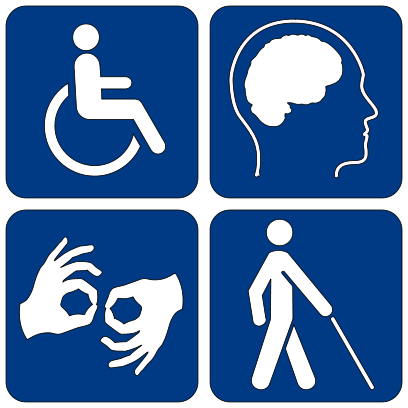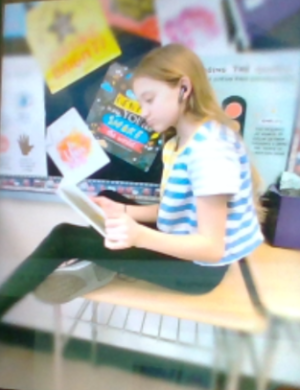Make A Difference With the Disabled

May 11, 2021
Take a second and think about the last time you interacted with a disabled person. They could be disabled physically, mentally, or anything in between. It’s probably been a hot minute. Now think about why you haven’t talked to a disabled person. After all, they are humans too. The fact that something that cannot be controlled is keeping smart and compassionate boys and girls from being socially active is terrible. Now, I’m not saying completely abandon your current group of friends, but you can do something about the unfair treatment disabled children are getting. I think it is very important that disabled children are being treated socially the same as all your classmates, and after reading this, I hope you agree.
Background on Disabilities
Disabilities come in many different forms. Like I said earlier, they can be physical disabilities, like blindness, deafness, or a deformity. There are also mental disabilities, including autism, which is an impairment with communication issues and monotonous behavior. Most disabled people are born with their disabilities, but some can be developed over time, as a child grows. Interestingly, disorders are actually more common than you think. 1 in 50 kids will either be born with or develop a disability. That means in about 2 elementary school classes, 1 kid might have a disability. This may seem like a lot, but some disabilities can’t really be seen . For example, epilepsy, a disorder that provokes seizures, isn’t technically seen by people, but is very much there. That’s a reason that just a smile and a wave can change someone’s day entirely. A lot of people don’t know what kids have going on in their life, and that could be a disability. Someone with a disorder can’t change it, those were the cards that they were dealt, so a smile can only do good.
Why You Should Spend Time With Children Who Have Disabilities
I have worked with fellow students with disabilities, and from my experiences, it bettered their day and mine. Able-bodied and minded kids are commonly told that it isn’t polite to stare, and when interacting with a disabled person, to tread lightly because you don’t know what is offensive. This encourages kids to stay away, and avoid disabled children. This is so wrong, and only hurts the child. All a disabled kid wants is to be like their classmates, and to be treated the same. Having the mindset that you can be offensive with every word, doesn’t help. One boy that I worked with would have a smile ear to ear when I would say “hi”. Just the act of saying hi, something everyone does every day, can completely change the mood of someone who is disabled. I don’t think people understand what some disabled kids go through every day, and how much of a difference someone can make in their lives. Some of our fellow classmates struggle with things that the majority of people find as easy tasks. Making their bed, getting dressed, or even eating breakfast can be a struggle, and that is within the first hour of their day! Struggling through that every time they wake up must be incredibly challenging, and that’s why just waving can turn someone’s frown upside down. Plus, it also makes you smile. When someone else is happy because of your impact, you become happy. So, what’s the worst thing that’s going to happen? You won’t offend them by waving, and it improves their day and yours.
Ways You Can Get Involved
I hope you see where I am coming from, and are inspired to make an effort to boost a disabled child’s day. There are many fundraising opportunities that pop up around our community. April was Autism Awareness month, but there are still many ways to help out. The website www.greatnonprofits.org has many different charities to donate to, some promoting disability awareness. However, I think it is most important to educate yourself. Reading books with different perspectives is a great way to get familiar with a disabled point of view. You are probably familiar with the novel Wonder, an award winning book about the perspective of a boy with a facial deformity. That is just the beginning. The Morristown Library and even our own school’s media center have countless options.
If you are more interested in really getting to know someone with a disability, there are a couple kids in Frelinghuysen that do have disabilities that you may know. You don’t have to spend every second of your school day talking to them, but getting involved can just be asking what their favorite food is or other basic questions. It’s so simple, and yet so impactful. When interacting with a disabled child, their smile will get wider, their mood will become happier, and after seeing them joyful, it makes you happy too. Don’t forget that not all disabilities are visible so it would be smart to interact with anyone you see. Getting involved doesn’t have to be a super big act, but just the smallest interaction is super important to a disabled kid, and it will make you happier.
In conclusion, interacting with someone who has a disability is beneficial to both sides, and I strongly encourage you to get involved. It by no means has to be spending 24/7 with them, but just taking fifteen seconds out of your day to say hi and ask how they are doing, definitely lifts the mood of both sides. I have come to admire how someone with a disability constantly struggles through everyday things that are so simple to their classmates, and yet they still persevere 7 days a week. Their determination and inner strength is amazing, and should be recognized. So go out and make a positive impact on someone today!
Works Cited
“Hidden / Invisible Disabilities.” Hidden Disabilities: What Are Some Common Hidden Disabilities?, www.ist.hawaii.edu/training/hiddendisabilities/05_hidden_disabilities.php.
“Mental Disorders.” World Health Organization, World Health Organization, www.who.int/news-room/fact-sheets/detail/mental-disorders#:~:text=Mental disorders include: depression, bipolar,mental disorders such as depression.
“Pregnancy, Birth and Baby.” Pregnancy, Birth and Baby | Pregnancy Birth and Baby, pregnancybirthbaby.org.au/.
“What Is Autism?” Autism Speaks, www.autismspeaks.org/what-autism.
projects, Contributors to Wikimedia. Wikimedia Commons, Wikimedia Foundation, Inc., 9 Sept. 2020, commons.wikimedia.org/.




